Beef
British red meat bodies are stepping up efforts to promote Welsh and Scottish red meat overseas.
Hybu Cig Cymru (HCC) – red meat promotion Wales, Quality Meat Scotland (QMS) and Eblex have all reported internationl promotional activity.
HCC reported three visits from European meat buyers have been arranged in recent weeks, and HCC also has high hopes of forming relationships at exhibitions TuttoFood in Italy and HOFEX in Hong Kong in the coming weeks.

/>
Two inward visits involved wholesalers and a supermarket buying group from the Netherlands. The wholesalers visited a major processing plant for a site tour, which included viewings of the lamb line, while the second Dutch visit was focused on Welsh Beef.
Laura Pickup, HCC market development manager, commented: “The inward missions were very successful and the representatives were in awe of the Welsh landscape and efficiency of the processing plants. They were also very impressed with the taste and tenderness of the meat.
“This was evident amongst the wholesalers, which included representatives from a premium cash and carry outlet, as they have since decided to replace their current supplies of lamb with Welsh Lamb.”
Meanwhile, Scottish meat body QMS and Eblex will also be showcasing at the Hofex trade show in Hong Kong, in a bid to increase exports.
Hofex is the region’s leading food and hospitality trade show – attracts around 2,400 international exhibitors and 40,000 buyers from the region and runs from May 6 to May 9.
“While the volume of Scotch Beef and Scotch Lamb currently being sold to customers in Hong Kong is relatively small we can see real opportunities for growth there,” said Laurent Vernet, QMS’s Head of Marketing.
“Our particular focus at the moment is developing our customer-base in the food service and deli-retailer sectors and longer-term we are confident that Hong Kong will be key to gaining wider access to other potentially lucrative markets in south-east Asia,” said Vernot.
Cattle prices are coming under pressure from slow consumer demand and ample supply, Eblex has warned.
This combination, experienced by both domestic and imported beef, continues to drive some restraint among processors, the red meat levy board reported, resulting in “downward pressures” on the prime cattle market.
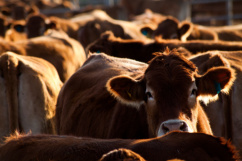
In the week ending 18 April prices for all classes of cattle fell – all prime deadweight cattle prices were 3p down on the previous week.
Similar pressures have been felt in the Scottish beef cattle trade, where animals have been kept on farms instead of being sent for slaughter. Eblex said this was giving rise to fears the beef market could return to the crisis point it found itself in last year when the beef price crashed.
However, Debbie Butcher, senior market analyst at Eblex, said this could change as the season moves into its “transitional period”.
“This development has been a feature of the market for a couple of months or so and reflects the continued imbalance in supply and demand. However, with the expectations that cattle supplies are set to tighten, (throughputs in March and April so far suggest this may have already started) the balance in the trade could move into a position that is less out of kilter, in particular as the season moves towards its transitional period between yarded and grass-fed supplies,” Butcher commented.
Eblex reported that lower cattle numbers in Ireland, resulting in fewer imports, could help support the market in the medium term.
“However, with the current fine weather unlikely to stimulate demand for roasting cuts, it is likely that caution among processors could persist in the short term, which, coupled with the euro exchange rate and its impact on the competitiveness of UK product on the continent, continues to offer some downside risk to the trade,” Butcher concluded.
Offal distributor Elmgrove Foods has made the Sunday Times Virgin Fast Track 100 list, made up of country’s fastest-growing companies.
Elmgrove Foods of Co Tyrone, Northern Ireland, produces more than 100 beef, lamb, pork and chicken offal products, which are all distributed internationally. The company made it to 62 on the Sunday Times list.
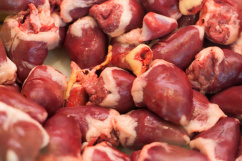
To make it into the top 100, companies must have an operating profit of over £500,000 and annual sales must exceed £250,000. The distributor makes 100% of its profits from exports.
Stuart Dobson, managing director, said he was “thrilled” to have made the Fast Track 100 list, adding that the market for fifth-quarter products continues to grow.
“The export business for offal is becoming more and more competitive, with increased numbers of UK export start-ups and international customers coming direct to source products. Forging and maintaining long-lasting relationships between suppliers, customers and our strong team have been our recipe for the company’s success. Elmgrove’s key is creating new products regularly, our portfolio has over 100 products, which are of high quality and exceed customer expectations,” Dobson told Meatinfo.co.uk.
Elmgrove Foods also won last year’s Food and Drink Federation Exporter of the Year award, as well as the Queen’s Award for Enterprise 2013.
Richard Branson, owner of Virgin, which has sponsored the fast-track list since it began in 1996, said: “This year’s Fast Track 100 is packed full of examples of entrepreneurs taking on many different challenges head-on. Their success is based on real team spirit and it is this togetherness, above and beyond any other factor, that sets great businesses apart from also-rans. The Fast Track 100 is testament to that spirit of creativity and camaraderie.”
Protected Geographical Indication (PGI) West Country Beef has been chosen by Tesco for use in its ‘Finest’ range.
The PGI beef, sourced from Two Sisters Foods in Bodmin, Cornwall, will fill Finest Steak Pies, made by Tamar Foods in Callington, also in Cornwall, for stores nationwide.
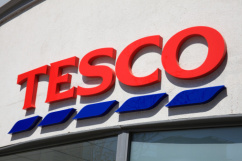
/>The West Country PGI status, which covers both lamb and beef, was obtained thanks to work done by strategic advisory body Meat South West (MSW) and other organisations.
Peter Baber, chairman of MSW, said: “We worked incredibly hard to help secure the PGI for both West Country Beef and West Country Lamb. Tesco’s decision to use West Country Beef in its Finest steak and steak and ale pies is a direct result of those efforts.
“It is incredibly promising news for West Country produce. We are delighted with the outcome and the benefits that will bring to the region’s farmers and processors, who can take advantage of the premium status given to the region’s beef and lamb now eligible to carry the PGI.”
To qualify for the protected status, the lamb and beef must be at least 70% forage-fed, and come from stock born, raised and finished in Cornwall, Devon, Somerset, Gloucestershire, Dorset or Wiltshire.
Gary Bound, purchasing manager for Tamar Foods, said: “We are delighted to be able to use PGI West Country Beef in this top-tier product for our retail customer. The recent awarding of PGI status has given us the opportunity to use high-quality, regional beef, which reduces food miles, secures employment locally and adds value to the regional economy.”
A young butcher has been declared the Yorkshire champion in the 2014 Young Butchers Creative Meat Display Competition.
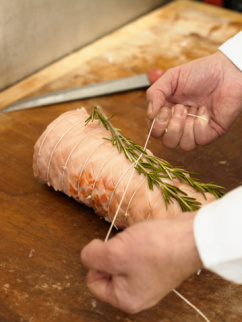
The event, which is was organised by butchery supplier Dalzeil, saw Joe Smith, from Lishman’s of Ilkley, steal the crown during a close fought competition in Glasshoughton, near Wakefield.
Joe, 21, said: “We were given two hours to work our magic on shoulders of lamb and pork, a knuckle of beef and a brace of chickens. We had to cut them up and make as many dishes as possible out of these products without having any waste.
“The judges were looking at our butchery and presentation skills and the imagination used to create the products. I produced 15 different dishes in total and was over the moon to be chosen as Yorkshire champion. Events like these are a great learning curve.”
Joe, who holds a NVQ Level 2 Meat & Poultry qualification and has completed his apprenticeship, has worked at Lishman’s for the past four years and has progressed quickly, with his efforts seeing him recently promoted to assistant shop manager.
Joe received a trophy, certificate, £100 worth of vouchers and butchery knives to the value of £200, presented by the British and Commonwealth featherweight boxing champion Josh Warrington, of Leeds.
Dalziel’s regional operations manager Mike O’Hara praised all the contestants. He said: “They demonstrated a high level of professionalism and excellent butchery skills. The overall displays were very impressive and inspirational.”
UK meat leaders have expressed disappointment over the reporting of a US-based study which claimed that beef production was 10 times more damaging to the environment than other livestock.
The study, published in the Proceedings of the National Academy of Sciences (PNAS), claimed that by applying a uniform methodology to data from the US Departments of Agriculture, the Interior and Energy, it showed that beef was far ahead of other proteins when it came to environmental impact.
A summary of the study said: “The authors found that impacts of dairy, poultry, pork, and eggs were mutually comparable within a factor of two. Beef, however, required 28 times more land, 11 times more irrigation water, five times more greenhouse gas emissions, and six times more reactive nitrogen fertiliser than the respective average burdens of the other four livestock categories.

”Plant-based production, however, including potato, wheat and rice, on average needed “two to six times fewer resources per calorie consumed than non-beef livestock”, it added.
The news has been widely reported across mainstream media, but UK meat bosses have hit back at the coverage, which they said failed to recognise that US production differed considerably from UK grass-fed production.
Nick Allen, sector director for red meat levy body Eblex, said: “Our rain-fed pasture system means we have one of the most efficient and sustainable livestock production systems in the world. In the UK, cattle and sheep primarily convert grass, which cannot be used to feed people, into nutritious food for our growing population. We have very little reliance on irrigation; in fact it takes just 67 litres of water to produce 1kg of beef.
“There are also additional environmental benefits of grazing ruminants, not least in terms of landscape management and maintaining biodiversity, yet livestock production still comes in for undue criticism.
”One of the authors of the report Professor Gidon Eshel, speaking to The Guardian newspaper, acknowledged that US grain-fed production systems exacerbated the issues surrounding feed inefficiency, but he said that even grass-fed cattle had greater environmental footprints than other animal products.
He said the aim of the study was to change the consumer mind-set: “While my work in recent years has clearly demonstrated that plant-based diets exact lower environmental costs than animal-based ones, in the new paper we recognise that this and related work by others have changed little in US diets; people still eat animal-based products with an ever-increasing gusto.
“Our study has a number of implications. First, it can help environmentally minded individuals make environmentally better dietary choices. Perhaps more importantly, the paper can also help inform US agricultural policy.”
In the wake of the UK’s beef pricing crisis, Waitrose has raised its “price floor” for British beef.
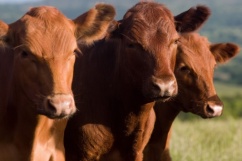
The supermarket set a minimum price it would pay British farmers for their beef at £3.40 per kilo until September 2014. However, this has now been raised to £3.45 per kilo until 1 October 2014. In addition to this price rise, Waitrose will also raise the price paid for standard British cattle, used for the Essential Waitrose range, by 0.02p per kilo. “Because British beef is such a key part of our business and we are certain that a further erosion of prices will not serve well processors or producers, we decided, in early May, along with our own dedicated processor Dovecote Park, to set a price floor for beef,” a spokeswoman for the supermarket told Meatinfo.
Meatinfo has reported extensively on the beef pricing crisis affecting British farmers, who have seen the farmgate price for beef cattle drop significantly. Farmers argue this has been caused by cheaper imports flooding the market, especially from Ireland, coupled by a lack of commitment from supermarkets to support British farmers.
This step from Waitrose has been welcomed by the National Farmers’ Union (NFU), which is urging other supermarkets to follow suit. Pete Garbutt, chief livestock advisor at the NFU, told Meatinfo: “This is good news and an example of a supermarket standing by its suppliers and looking to the long term.
“When Waitrose announced its threshold price last month the NFU came out and praised it publicly. This is a great example of supermarkets working for the long term and would love other supermarkets to take a similar view.”